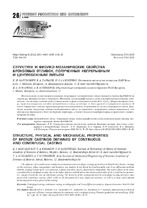Структура и физико-механические свойства бронзовых отливок, полученных непрерывным и центробежным литьем

Date
2020Publisher
Another Title
Structure, physical and mechanical properties of bronze castings obtained by continuous and centrifugal casting
Bibliographic entry
Структура и физико-механические свойства бронзовых отливок, полученных непрерывным и центробежным литьем = Structure, physical and mechanical properties of bronze castings obtained by continuous and centrifugal casting / Е. И. Марукович [и др.] // Литье и металлургия. – 2020. – № 2. – С. 26-28.
Abstract
Изучено влияние режимов кристаллизации (непрерывное и центробежное литье) отливок из бронзы БрА10Ж4Н4 на структуру, фазовый состав и твердость. Методами металлографического и рентгеноструктурного анализов установлено, что отливки состоят из (α+γ')-эвтектоида, α-фазы и интерметаллидов AlCu, Al2Cu3. Матричная фаза в сплаве, закристаллизованном методом центробежного литья, вследствие ее более высокой легированности атомами Al имеет повышенное значение параметра кристаллической решетки по сравнению со случаем непрерывного литья. Твердость отливки, полученной методом центробежного литья, по сравнению с непрерывным литьем повышается, что обусловлено образованием более дисперсной структуры, а также большим твердорастворным упрочнением матричной фазы отливки.
Abstract in another language
The influence of crystallization conditions (continuous and centrifugal casting) of small-sized BrА1Fe4Ni4 bronze castings on the structure, phase composition, and hardness was studied. It was found by metallographic and X-ray diffraction methods that the castings consist of (α + γ')-eutectoid, α phase and AlCu, Al2Cu3 intermetallic compounds. The matrix phase in the alloy, crystallized by centrifugal casting, due to its higher alloying with Al atoms, has an increased value of the crystal lattice parameter, compared with the case of continuous casting. The hardness of the casting obtained by centrifugal casting increases compared with continuous casting, which is due to the formation of a more dispersed structure, as well as a large solid solution hardening of the matrix phase of the casting.
View/
Collections
- № 2[16]
